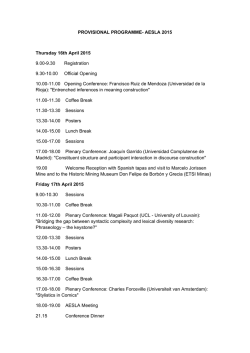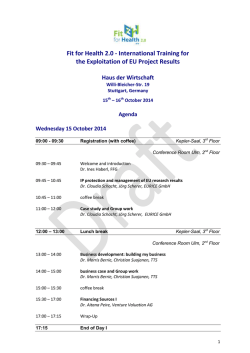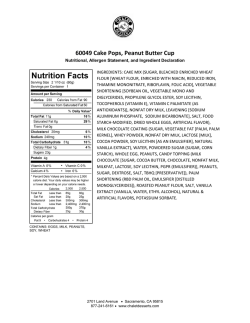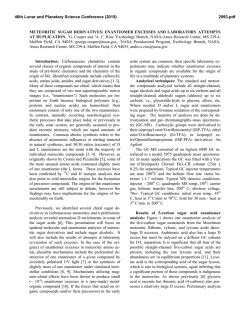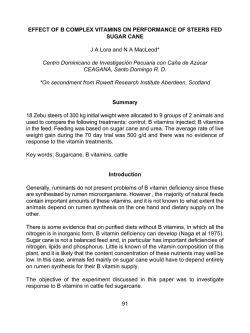
Lab 1
Lab1
• Problem
– Given TWO textual files, count the number of words that are common (using the naïve scheme – 4 Mapreduce stages –
discussed in later slides)
• Goals
– You should learn how to • read multiple input files in MapReduce, • write programs that involve multiple stages, • perform a task that combine information from two files,
• Scenarios to consider
– Use multiple reducers in stage 1 and stage 2
– Remove stop‐words like “a”, “the”, “that”, “of”, …
– Sort the output in descending order of number of common words
1
Lab1
• Input data
– Use the stop‐word file:
• http://www.comp.nus.edu.sg/~tankl/cs5344/data/sw3.txt
– Use the following two files:
• http://www.comp.nus.edu.sg/~tankl/cs5344/data/844.txt
• http://www.comp.nus.edu.sg/~tankl/cs5344/data/1952.txt
• Deadline: 16 Feb 2015 (Monday) 1200 hours
• Submit the following: – Your MapReduce program (with documentation within the code)
– Top‐20 output of the result using the data files listed above
• You only need to extract this number from the sorted output.
2
Running Example
• File 1
– He put some sugar into his coffee, as he always did.
• File 2
– He had sugar in his coffee.
• Output:
1
1
1
Sorted frequencies of common words
(key)
he
sugar
coffee
Common words
(value)
3
Naïve Solution
• 4 MapReduce stages
Stage 1: (WordCount)
File 1
he
sugar
coffee put
…
2
1
1
1
4
Naïve Solution
• 4 MapReduce stages
Stage 1: (WordCount)
File 1
he
sugar
coffee put
…
2
1
1
1
Stage 2: (WordCount)
File 2
he
sugar
coffee had
…
1
1
1
1
5
Naïve Solution
• 4 MapReduce stages
Stage 1: (WordCount)
File 1
he
sugar
coffee put
…
2
1
1
1
Stage 2: (WordCount)
File 2
he
sugar
coffee had
…
Stage 3: (Count words in common)
Notice: Stage 1 and Stage 2’s output together become the input of Stage 3.
Keep the smaller value!
he
sugar
coffee 1
1
1
1
1
1
1
6
Naïve Solution
• 4 MapReduce stages
Stage 1: (WordCount)
File 1
he
sugar
coffee put
…
2
1
1
1
Stage 2: (WordCount)
File 2
he
sugar
coffee had
…
Stage 3: (Count words in common)
Notice: Stage 1 and Stage 2’s output together become the input of Stage 3.
Stage 4: (Sort)
Keep the smaller value!
he
sugar
coffee 1
1
1
1
1
1
he
sugar
coffee
1
1
1
1
7
Zoom in Stage 3
key
Input1
he
sugar
coffee put
…
2
1
1
1
Map1
key
Input2
he
sugar
coffee had
…
he
sugar
coffee put
…
1
1
1
1
Map2
he
sugar
coffee had
…
value
Identifier for Stage 1
(2, s1)
(1, s1)
(1, s1)
(1, s1)
value
(1, s2)
(1, s2)
(1, s2)
(1, s2)
Identifier for Stage 2
8
Zoom in Stage 3
Input1
he
sugar
coffee put
…
2
1
1
1
Map1
he
sugar
coffee put
…
Reduce
Will be sent to the same reducer!
Input2
he
sugar
coffee had
…
(2, s1)
(1, s1)
(1, s1)
(1, s1)
1
1
1
1
Map2
he
sugar
coffee had
…
(1, s2)
(1, s2)
(1, s2)
(1, s2)
he
sugar
coffee 1
1
1
Reduce
9
Implementation for Stage 3
• Input: – Stage 1 output files, e.g., under /lab1/stage1/output
– Stage 2 output files, e.g., under /lab1/stage2/output
• Problem: – We have two different input paths.
– We have two different map functions. 10
Implementation for Stage 3
• Usage of MultipleInputs
//in the beginning *Import org.apache.hadoop.mapreduce.lib.input.MultipleInputs;
// in main function, add the following sentences:
Input path 1
MultipleInputs.addInputPath(job, inputPath1, inputFormatClass1, mapper1.class);
Input format of files in path 1 Map function for files in path 1
MultipleInputs.addInputPath(job, inputPath2, inputFormatClass2, mapper2.class);
11
Implementation for Stage 3
• Define two types of mappers
//Mapper 1: (deal with word counts of file 1)
public static class Mapper1 extends Mapper<Object, Text, Text, Text>{
public void map(Object key, Text value, Context context) throws IOException, InterruptedException { //read one line, parse into (word, frequency) pair
//output (word, frequency_s1) }
}
//Mapper 2: (deal with word counts of file2)
public static class Mapper2 extends Mapper<Object, Text, Text, Text>{
public void map(Object key, Text value, Context context) throws IOException, InterruptedException { //read one line, parse into (word, frequency) pair
//output (word, frequency_s2) }
}
12
Implementation for Stage 3
• Define one reducer function
//Reducer: (get the number of common words)
public static class Reducer1 extends Reducer< Text, Text, Text, IntWritable>{
public void reduce(Text key, Iterable<Text> value, Context context) throws IOException, InterruptedException { //parse each value (e.g., n1_s1), get frequency (n1) and stage identifier (s1)
//if the key has two values, output (key, samller_frequency) //if the key has only one value, output nothing
}
}
13
Overall Implementation
• Put all the codes into one file
//in the beginning, import necessary libraries
import …;
//define all the mapper classes and reducer classes
public static class WCMapper…
public static class Mapper1…
public static class Mapper2…
public static class SortMapper…
public static class Reducer1…
……
//Main function
//for Stage 1: (1) new a job (job1), (2) set job1 information (e.g., input/output path, etc.)
(3) job1.waitForCompletion(true)
//For stage 2
……(same procedure)
//for Stage 3
……(same procedure)
//for Stage 4
……(same procedure)
14
Remove Stopwords
• Put stop word file into HDFS
– hadoop fs ‐put stw_file_path hdfs_dir
• In the beginning of WordCount.java
– Add the following libraries
import java.io.BufferedReader;
import java.io.IOException;
import java.io.InputStreamReader;
import java.util.HashSet;
import java.util.Set;
15
Remove Stopwords
• In mapper, add setup function to load stopwords file from HDFS and parse contents into a set of words
public static class TokenizerMapper extends Mapper<Object, Text, Text, IntWritable>{
Set<String> stopwords = new HashSet<String>();
store stopwords
@Override
protected void setup(Context context){
Configuration conf = context.getConfiguration();
try {
Replace path.stopwords with the Path path = new Path(“path.stopwords”);
real stopword file path in HDFS
FileSystem fs= FileSystem.get(new Configuration());
BufferedReader br = new BufferedReader(new InputStreamReader(fs.open(path)));
String word = null;
while ((word= br.readLine())!= null) {
stopwords.add(word);
‐Read contents from the file
}
‐Parse each line to get a stopword. } catch (IOException e) {
‐Keep all the words into stopwords set
e.printStackTrace();
}
} 16
Remove Stopwords
• Modify mapper function to filter stopwords
public void map(Object key, Text value, Context context
) throws IOException, InterruptedException {
StringTokenizer itr = new StringTokenizer(value.toString());
while (itr.hasMoreTokens()) {
word.set(itr.nextToken());
Ignore the word if it is contained in if(stopwords.contains(word.toString()))
stopwords set
continue;
context.write(word, one);
}
}
}
17
© Copyright 2026
